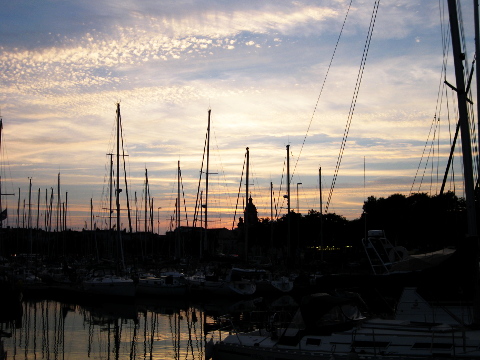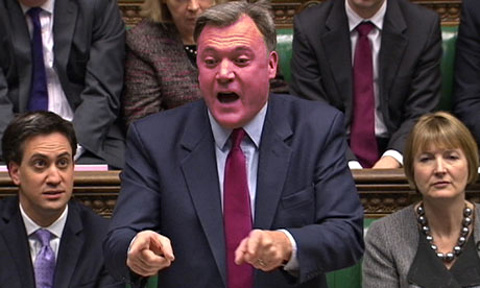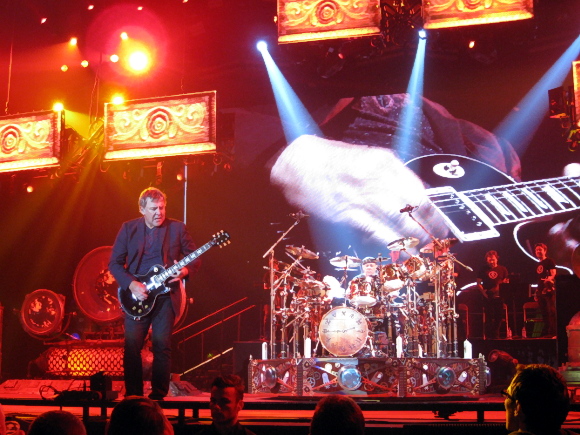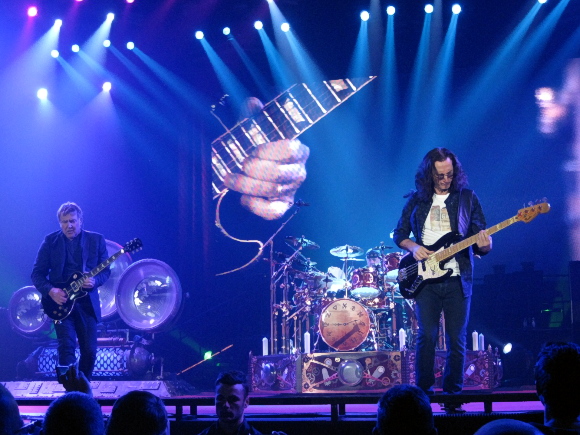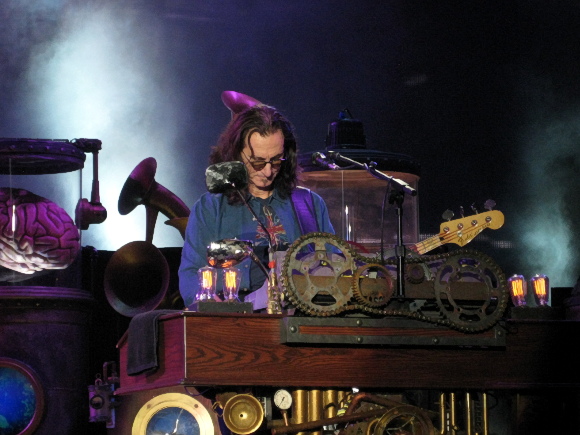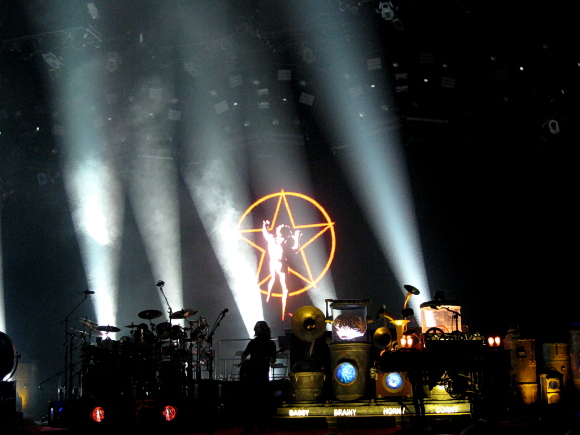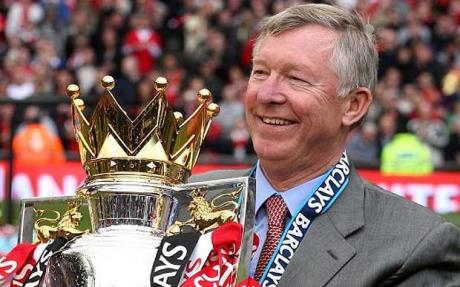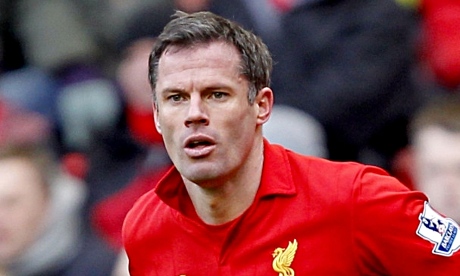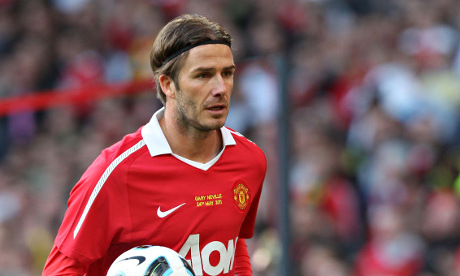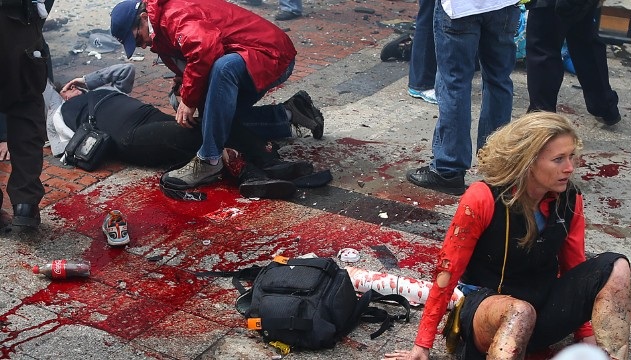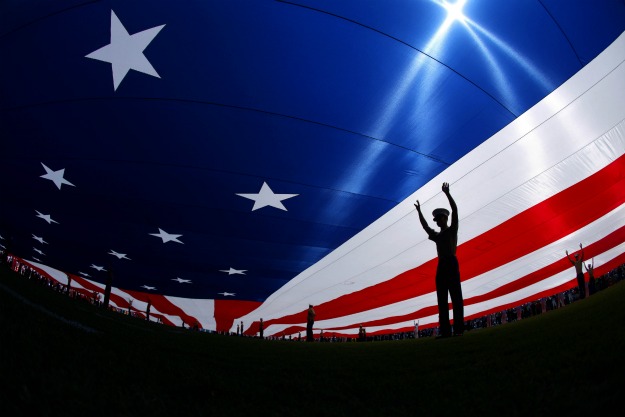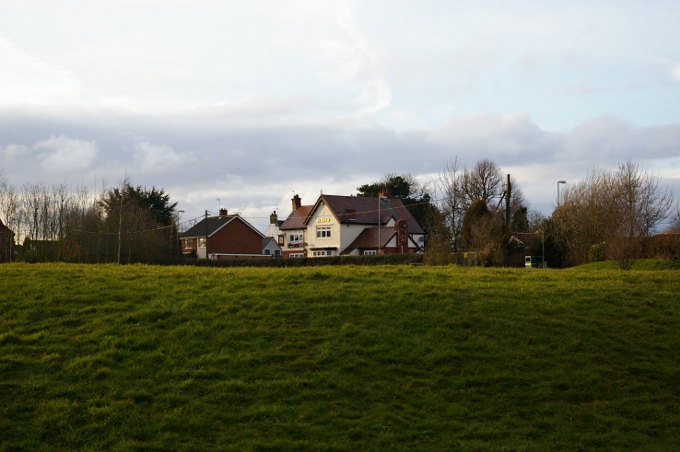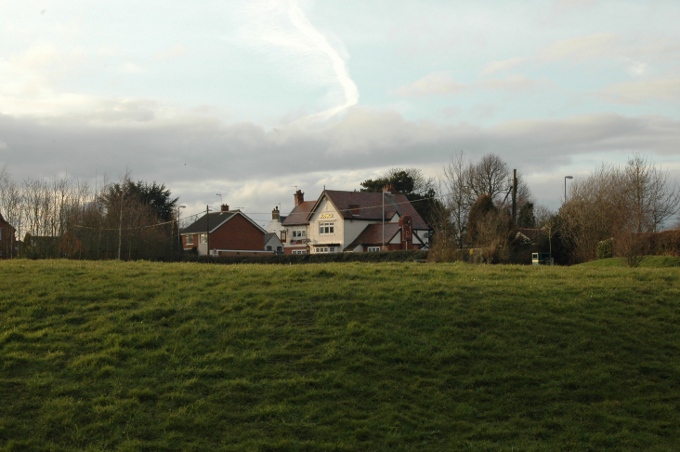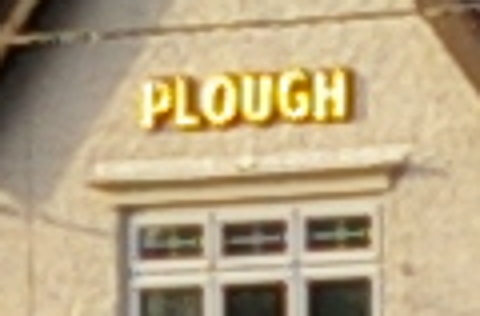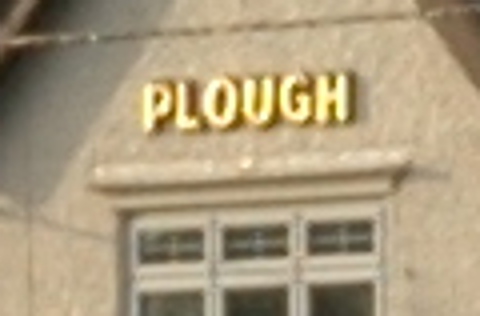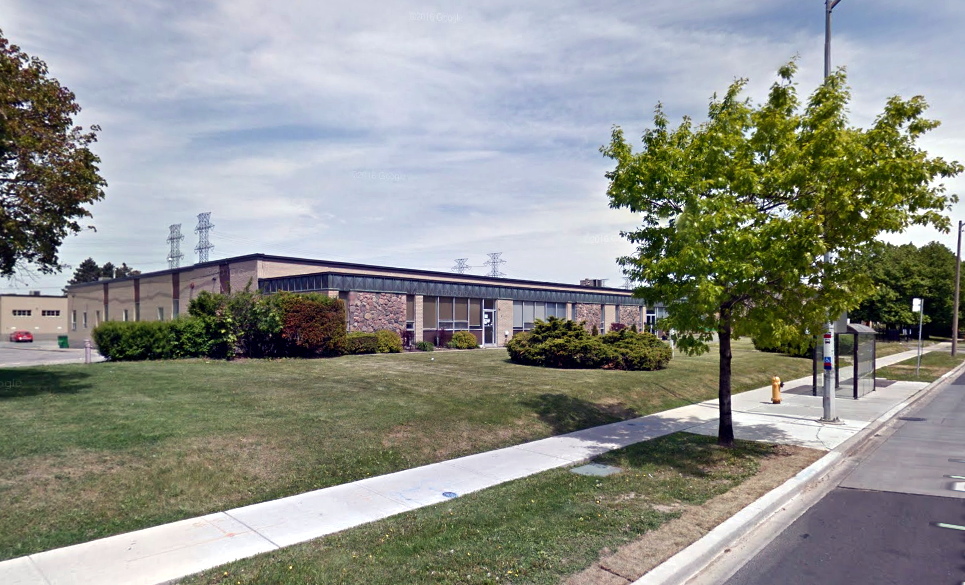An exhibition of World War Two equipment that I saw yesterday made me think about the way technology has changed in my lifetime. The remarkably quaint and primitive-looking military telephone that I saw there would have been something like state-of-the-art only twenty years before my first day at school.
I thought it might be interesting to compile a list here of the technological innovations that have made the biggest difference to me personally in my own lifetime. Of course nearly every aspect of everyday life has been influenced and changed by the creep of technological progress and the following are just tokens of that really.
Furthermore, none of them is really a single innovation; for example some depend on underlying technologies like the microchip, the LCD display and the transistor which were themselves dramatic and fascinating innovations in their own right. But here they are anyway, in rough chronological order.
Colour TV
The television had been invented long before I was born, and what a marvel that must have been for the early adopters of that technology – even to stare at fuzzy moving monochrome images on a tiny curved screen must have been a thrill to people who could afford it in the 1940s.
I grew up with television. There were three TV channels in the ’70s, but we could only receive two on our black & white TV: BBC 1 and ITV. The day we got our first colour TV, one day in 1973, was possibly one of the happiest days of my life. I remember sitting down in front of it, awestruck. Colour television was hypnotic; almost hallucinogenic. Even so, most TV programmes were still shown in black & white, as I recall. The TV listings in the Radio Times would cleverly indicate which programmes were to be shown in colour by the inclusion of the word Colour in italics next to the title.
After Colour TV nothing was the same again.
Quartz Timekeeping
In the early ’70s, watches were strictly mechanical, and not particularly accurate. You wound your watch up in the morning, and set it every day or two by a time signal broadcast on the radio, or by the “speaking clock” service available via your telephone.
But in 1975, while watching an episode of Kojak, I was stunned to see Telly Savalas press a button on the side of his watch, thereby causing a row of glowing red numerals to appear upon its dark face. It was possibly the most desirable thing I’d ever seen. A year or two later I had my own LED digital watch, and I was very proud of it. But quite honestly they weren’t particularly practical. The battery would expire every few months, and you had to operate a button to tell the time.
It wasn’t until LCD became the display technology of choice that the digital watch truly came of age. I bought my first LCD watch in 1981 or so. By this time, many analogue watches were also powered by quartz movements. You could now keep your watch in a drawer for a few weeks without having to set the time on taking it out, and you could depend on it being accurate to within a few seconds a week, or better.
Seiko’s advertising at the time claimed that “one day, all watches will be made this way”. But interestingly, the old-fashioned mechanical watch didn’t die out completely. It is still popular with traditionalists, especially customers of more high-end brands like Hublot and Rolex.
A related innovation was the so-called radio-controlled (radio-synchronised, really) timepiece. These work by tuning into a time signal service sourced from an atomic clock and broadcast on shortwave transmitters, at regular intervals.
The first watches to use these were highly expensive and looked a little strange, with a conspicuous receiver module. These days they’re cheap, and look like ordinary watches.
I own four radio-controlled watches, and five radio-controlled clocks. They are accurate to within a small fraction of a second, all the time, and they adjust themselves when British Summer Time comes and goes.
HiFi
I first gained an appreciation of music from watching TV programmes like Top Of The Pops and from listening to my big brother’s records on his mono, portable record player. I must admit I still sometimes miss the smell of the valves warming up when listening to old Beatles songs.
But stereo music listening really was a revelation. My parents’ first stereo HiFi, a Sanyo as I recall, probably wasn’t really all that great. Actually it definitely wasn’t. But it certainly seemed a lot better than their old ‘radiogram’, or my brother’s old record player. I bought one for myself in 1980, a Sony – and that was the business.
The Pocket Calculator
My Dad occasionally brought home an electronic calculator from his place of work in the early ’70s. It was the size of a small typewriter, was powered by mains electricity and had a nixie tube display. I simply could not believe the speed at which it performed what, to me, seemed like complicated arithmetic calculations. You’d key in something like 16 x 23 and the very instant you hit the = key, the solution would be glowing on its display. It didn’t even seem to have to think about it.
By 1977, it was possible to manufacture electronic calculators that were small enough to be powered by a battery, and inexpensive enough to be purchased by anyone who needed to use one. I can’t remember what brand my first calculator was. The first ones had LED displays, like the digital watches of the time. But I do remember putting away my slide rule for good.
Calculators are quite interesting in one sense. I still own, and occasionally use a couple of calculators that I’ve had since the mid ’80s. They aren’t really much different from a calculator that you’d expect to find in a shop today. It seems that, like the shark and the wasp, the pocket calculator has long since reached its evolutionary potential.
The Video Recorder
My parents bought our first VCR in 1981, ushering in a revolution in the art of watching TV in our household. Important broadcasts could now be saved for posterity, and watched over and over again. You didn’t have to hope for a repeat. I recorded every episode of Blackadder II and The Young Ones and watched them repeatedly. Furthermore you didn’t have to miss a programme because another was on a different channel at the same time, or because you were out, or you’d gone to bed.
You could go out and rent, or buy feature films to watch at home. You could even now watch the sort of film that, let’s say, you’d be highly unlikely to see broadcast on one of the mainstream TV channels, in the comfort of your living room.
In the 21st century, video recorders record incoming programmes in original broadcast quality onto a hard drive. They know what time your favourite TV programmes are on, and they will record them for you automatically.
Joy.
The Microcomputer
Computers seemed impossibly complicated and esoteric to me as a young man, even though in many respects they were a fair bit less complicated than they are now. In the 1970s a computer seemed to be a huge thing, requiring its own room, maintained by boffins in white coats and festooned with tape reels and flashing lights. A large corporation or university might own perhaps as many as one of them. I couldn’t really imagine what “computer programming” might entail.
But by the early 1980s, advances in solid state technology and miniaturisation ushered in the age of the ‘microcomputer’ – and brought computing within the reach of ordinary people. My parents bought a Sinclair ZX81 – an impossibly primitive machine with a little touchpad keyboard and a tiny, one kilobyte memory that plugged into the TV. Later they bought a rather more usable 32K BBC Micro. I spent many hours playing computer games, but also learning to write programs in a simple language called BASIC – a pursuit that led to a degree in Computer Science, and a career as an IT specialist.
A lot of people did nothing more adventurous than playing the games, of course. I must admit my happiest memories of our BBC Micro are of hours spent immersed in the space trading / shoot-em-up game Elite.
By now, most homes have at least one “microcomputer” – the term is redundant now that even the most powerful computers are physically small – and most workplaces have them scattered around their employees’ desks.
The Microwave Oven
To be honest, I don’t recall having been excited by our first microwave oven, acquired one day in 1985. In fact I was wary of it at first. I used to leave the room while it was switched on. But most of the food I eat these days is prepared in a microwave, and certainly it’s an awful lot more convenient than sticking things in saucepans. The microwaveable plastic container, first available in 1986 ushered in the era of the microwave ready meal, and was probably equally important.
Portable Audio
I never did have a Sony Walkman, the cassette player that wasn’t much bigger than a cassette, and allowed people to listen to music “on the go”. But I did buy a portable headphone AM/FM radio with a belt clip in 1984. I bought a smaller one ten years later when I lived in London, and it accompanied me everywhere – on the tube and train commuting to and from work, and walking around the West End on a Saturday. To this day it’s rare for me to leave the house without my portable radio if I’m likely to be walking or cycling for any appreciable duration. In the late ’90s I bought a MiniDisk player that allowed me to carry a few records around with me. I now have an MP3 player that contains more than 700 albums, with room to spare.
Digital Audio
The great enabling factor of portable audio is of course the possibility to represent music (or speech, or whatever) in a digital format that can be squeezed into an electronic storage medium. But it was in traditional, home music-listening that digital audio first made its mark – in the form of the Compact Disc. I bought my first CD player in 1992, although they had been available for a few years before that.
Compact Discs were physically smaller than vinyl records. They were a lot more tolerant of minor scratches, and they didn’t wear out. You could now skip from one track to another at the press of a button. You could play them in a car. And despite what some luddites will tell you, even to this day – they provided substantially better audio quality than vinyl as well.
Later came the MiniDisk and the MP3; formats using a compressed representation intended to allow music to be listened on portable devices. In recent years it has been possible to buy and download a music album in a matter of minutes, even in a lossless format, thanks to the ease with which digital information can be transferred over a network.
The Internet
This is the big one, for me. It’s just not possible to overstate its influence.
It’s probably instructive to think of it as having two phases. When I first sat down in front of an Internet-enabled workstation in the ’90s, relatively few people had access to the World Wide Web and email. As it became available to the public in general, no longer the domain of academics and technology professionals, most people who used it gained access via a slow, dialup connection.
Even in this early phase, the Internet was massive for me. Being able to communicate with people in different countries every day on messageboards or via email, browse websites dedicated to particular interests, look up information using an Internet search – this was all invaluable to me.
Later, as broadband Internet connections took over from dialup connections and computers became more powerful and capable, the Internet gained a new role as a multimedia platform – in the 21st century it became possible to listen to radio and TV programmes in high quality, or download films and music in large quantities.
These days I do most of my shopping online, on the Amazon site or at play.com. I do my banking online. I’m able to work from home thanks to my Internet connection. The company I work for, like many others, relies on the Internet to provide its services.
The really nice thing about the Internet is the number of services it provides access to that are free to use. Google Maps, Outlook Mail, file-sharing facilities like Dropbox. Operating Systems like Linux and FreeBSD can be downloaded free of charge. Thousands of videos of varying quality can be viewed at YouTube at no cost. Photos can be shared on free sites like Flickr. You can share information on Facebook, Tumblr and Twitter for free. This blog and many others like it are, of course, free to read as well.
I don’t suppose there’ll be a technological innovation again in my lifetime that will make as much difference as the Internet did. But who knows?
The Mobile Phone
I first saw a mobile phone in 1987, on a train to Stevenage. It was being operated by a rather self-important-sounding managerial / executive person, issuing instructions to his minions back at the office. It was huge. It looked a bit like a walkie-talkie from a Vietnam war film.
By 1994 or so mobile phones had started to become relatively affordable, and small enough to carry around on a belt clip. I decided I had to have one by Christmas that year, and after an awful lot of deliberation and research, I bought one from the Orange shop at Liverpool Street Station. I didn’t actually think I needed it, but had decided that it would be a simply awesome gadget, or ‘toy’ if you prefer. My Nokia Orange 2140 was a primitive phone by today’s standards, certainly. It was actually considered a small phone at the time, about the size of two cigarette cartons, but it was too heavy to keep in a suit pocket. It didn’t last long before recharges. You could send text messages using its mono, character-only LCD screen, but only in upper case. It cost £250, in addition to the contract.
Sometime before every teenager seemed to have one, in the first few years of the 21st century, the mobile phone had lost its appeal as a professional status symbol. Now of course, a mobile phone can be a computer, Internet terminal, media player and camera as well as a telephone.
Digital Photography
I was a fairly keen photographer before I acquired my first digital camera in 2000. But it’s fair to say that my interest was transformed by it. Photography already had a long and distinguished history, yet I would argue that it only came of age on the day the first digital camera rolled off the production line.
In fact my first digital camera only had the necessary capacity to store about 70 photos on a 35MB memory card, only the equivalent of about two rolls of film. But I didn’t have to buy the film in the first place. More importantly I didn’t have to take my photos to a lab to have them processed. I could transfer them to my computer and see them immediately. I could tinker with the contrast, sharpen them, crop them, touch them up. And I could share them with friends and family anywhere in the world, or post them onto a public forum, within minutes. You can share your holiday photos while you’re still on holiday, using a laptop or even directly from a smartphone.
These days memory cards are cheap and hugely capacious. A 4GB card costing about £5 will hold about 1500 photos in my Pentax DSLR; that’s roughly the equivalent of 40 36-exposure rolls of film. And it can of course be used time and time again.
WiFi
The introduction of wireless network cards made using Internet-connected computers at home, and in some work environments, much easier. You didn’t have to worry about being close to an ethernet socket or dragging a long cable to your router or modem. In the present day, every laptop and smartphone has it built in so you can carry them around the house while connected. WiFi also allows Internet access to be provided easily in hotels, cafes and bars. Of course, if you haven’t set your router up properly it also allows your neighbours, and possibly even random passers-by to use your Internet connection. But it’s easy to prevent that if you know what you’re doing.
Flat Panel Monitors and TVs
Admittedly they don’t really do much different than their CRT ancestors, other than providing much higher resolution (thereby providing a medium for High Definition TV programmes and films). But they take up a lot less space even though they allow for much bigger screens, and they look nicer. A lot easier to carry around, as well, if you need to do that.
The present LCD technology which is used for these devices is an interim measure. Flat panel screens will come of age when technologies like AMOLED, which don’t require backlighting, can be used at an affordable cost.
Plasma screens don’t require backlighting of course, but let’s be honest – they don’t look that good either.
SatNav
I first bought a GPS receiver in the mid ’90s. It was a lot of fun to use, and actually quite useful for navigating around London – even though it had no built-in maps. It just told me how far away my destination was, and pointed the direction. I’d have to guess at which roads to take, but at least I never felt completely lost.
But satellite-guided navigation really came into its own with the advent of the SatNav – a GPS device that had two important additional features – a set of maps, and the logic to plan a route to your destination from your current position. I bought one of these three years ago for £99, and it has been absolutely invaluable for travelling by car. Gone are the days when you had to pore over a map to plan your route, or ask someone for directions after getting lost. Even when driving in France this year it provided clear and accurate navigation all the way from the English Channel to the Atlantic Coast.
Many smartphones and tablets have a GPS receiver built in, and the necessary maps and apps to provide SatNav functionality can often be found for free.


